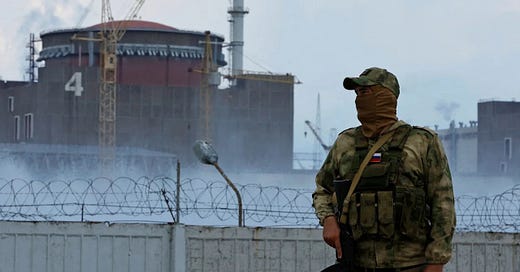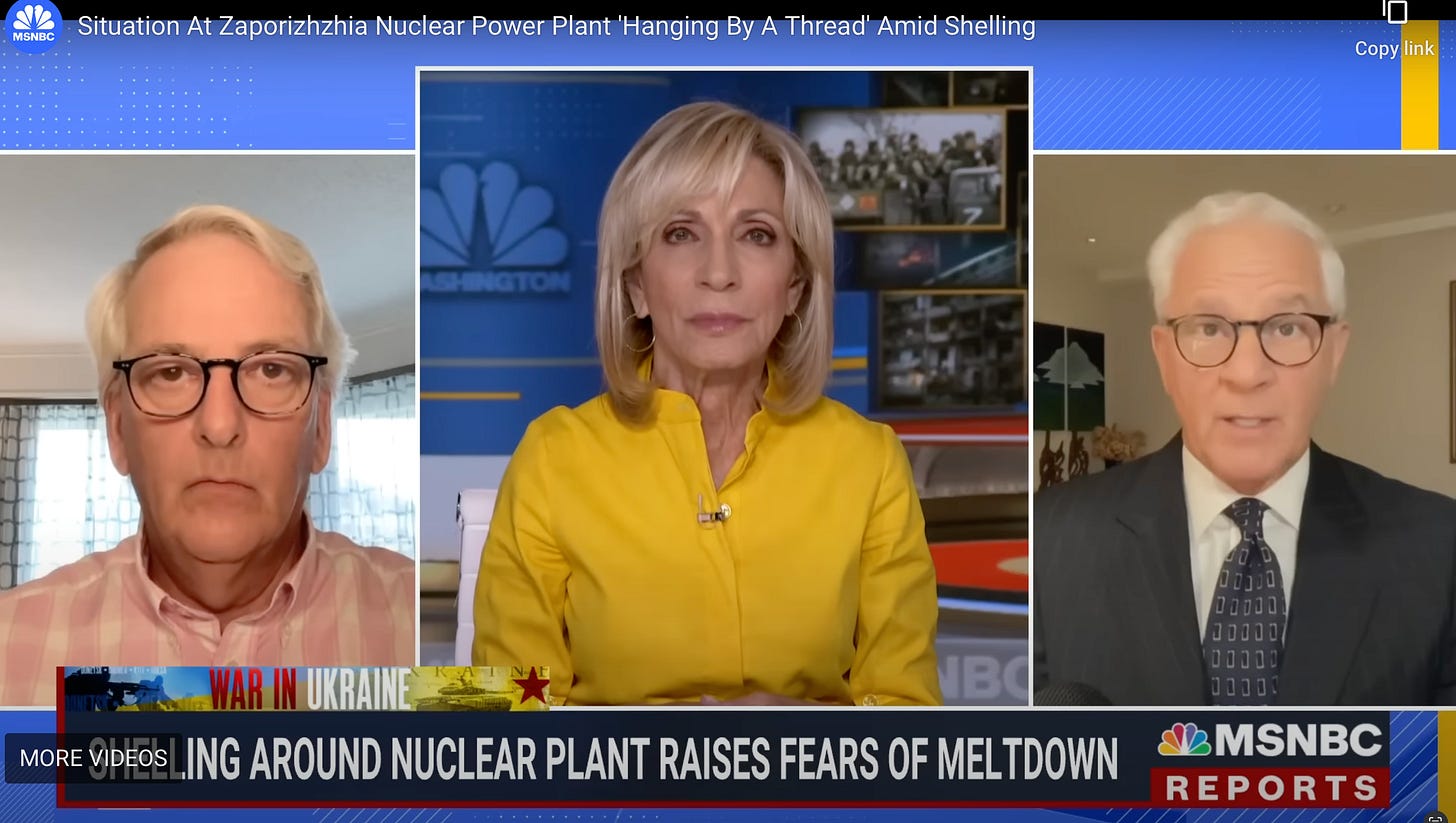Putin Threatens Nuclear Disaster at Zaporizhzhia
Threats to Europe's largest nuclear power plant are integral to Putin's game of nuclear chicken
Ukraine’s counter-offense to repeal the Russian invaders could begin very soon. It is expected to involve heavy fighting in the Zaporizhzhia region, as the Ukrainian army drives to cut the land bridge to Crimea that Russia created at the beginning of its war 16 months ago. This presents grave risks to Europe’s largest nuclear plant, located directly in the war zone. Through accident, attack or sabotage it could become the worst nuclear catastrophe since Chernobyl.
Today, The Daily Beast published my analysis of the dangers. While I cannot reproduce the piece here in this newsletter, I can share the main analysis and some key excerpts.
The danger is very real. Just yesterday, IAEA Director-General Rafael Marino Grossie warned that “The site’s fragile power situation continues to be a source of deep concern.” Earlier, Energoatom, Ukraine’s state nuclear company, warned that the plant is “on the verge of a nuclear and radiation accident.” Workers at the plant told Britain’s Sky News that they feared that the fighting could trigger the release of radioactive gases that “could cause devastation across much of Europe, Russia and the Mediterranean.”
The risk is that if electricity is cut to the plant, the thousands of fuel rods stored in cooling ponds at the plant and those within the six reactors could melt down, releasing hydrogen gas that then explodes, spewing radioactive particles in plumes that could travel hundreds or even thousands of miles. These fuel rods needs to be constantly cooled. If electricity is cut off, the pumps cannot circulate the water, the fuel rods will heat up and explode.
Grossi told the UN Security Council on May 30:
The nuclear safety and security situation at the Zaporizhzhya NPP, in particular, continues to be extremely fragile and dangerous…
The plant has been operating on significantly reduced staff, which despite being in temporary shut-down is not sustainable.
And there have been seven occasions when the site lost all off-site power and had to rely on emergency diesel generators, the last line of defence against a nuclear accident, to provide essential cooling of the reactor and spent fuel. The last one, the seventh, occurred just one week ago.
We are fortunate that a nuclear accident has not yet happened. As I said at the IAEA Board of Governors in March - we are rolling a dice and if this continues then one day our luck will run out.
Last year, I told MSNBC’s Andrea Mitchell that Zaporizhzhia was hanging by a thread. In my Daily Beast article, I detail the four ways that thread might be cut:
Fighting around the plant cuts the power lines or knocks out the power supply. This is the most likely scenario, particularly as the coming Ukrainian offensive is likely to try to advance across the Dnipro River and drive Russian occupying forces from the Zaporizhzhia region. One worker told Sky News that the back-up generators were not being properly maintained and he feared that they could not keep the power going.
Staff mistakes could trigger a disaster, as they did at Chernobyl and Three Mile Island. Since Russia occupied the plant in March 2022, the staff has dropped from 11,000 workers to about 3,500. Worse, “the quality of the workers is lower because the qualified staff left,” one worker said. There is now a “deficit of workers for repairs who can actually do the servicing and fix problems.”
A deliberate Russian attack could drain the pools or destroy the concrete domes around the reactors. A Ukrainian attack is unlikely - this is why Russia has now stored scores of military vehicles and munitions at the plant - but this is war and a stray missile or shell could hit a critical node.
There is also the possibility that Russia would sabotage the plant. They could intentionally destroy the plant in order to delay or defeat the Ukrainian advance. There are unconfirmed reports that Russia has planted explosives around key nuclear components at the site. Russia has begun mass evacuations around the plant.
This dangerous situation is not an unavoidable consequence of the war. Vladimir Putin could end the threat tomorrow. All he has to do is to end his illegal occupation of the plant. He could withdraw the military forces and equipment that he has stationed at the plant. He could agree to demilitarize the surrounding area, as the IAEA has begged him to do. This is not a “both sides” issue. Putin started this war, if he will not end it, he can at least do this.
There is little sign, however, that Putin will change his mind. He wants to keep the plant that once supplied 20 percent of Ukraine’s energy as a nuclear ace in the hole to play in his desperate efforts to win a war he his now badly losing. It is a key part of his game of nuclear chicken - and we could all be the losers.
Read the full article at The Daily Beast.







We could all be winners ultimately if the worst comes to pass in this case and the disaster shakes the foundations of nuclear weapons denial. This wouldn't be a nuclear weapons event specifically, but it would be a mass radiation event, which would have much the same effect as a nuclear weapon beyond the immediate local area.
We could all be winners ultimately if the Ukraine war teaches us that allowing the knowledge explosion to provide people like Putin with ever more, ever larger powers at an ever faster pace is unsustainable, and presents a do or die challenge for the modern world.
We could all be winners ultimately if such an event persuades us that what we've been doing about nuclear weapons and violent men since WWII is never going to make us safe. The sooner we face that, the sooner we'll be receptive to the necessary new ideas.
After 75 years there simply is no credible evidence that we're ever going to conquer these threats through a process of reason alone. If true, then sooner or later there is going to be some big event like an explosion at this plant, and somebody is going to have to pay the price for our stubborn ignorance. I hope it's not in Ukraine, but if it's not there, it will be some place else.
What I keep hoping experts will start writing about is this...
What should be the role of nuclear weapons experts and activists when the one bad day does happen, and consciousness raising is no longer necessary?
North easterly’s spring/summer. Just who does putin think he’ll radiate?